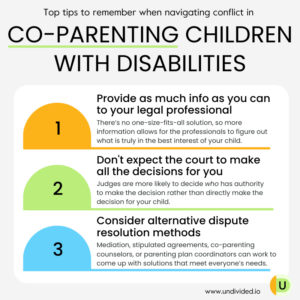As parents, it’s normal to worry about our kids’ futures. But when our kids have disabilities, the concerns may feel a lot bigger than we can handle. All the joys of parenting come hand in hand with the tough realities of making plans for situations we’d rather not think about if we had the choice. Like celebrating 18th birthdays — what comes next?! Or if you’re separated, trying to raise a child together, and can’t agree on educational, medical, funding, and/or therapeutic decisions? Who has final say? Or what kind of life will your child want to live, and where, and with whom? And what happens when we’re not around? Questions like these can keep any parent up at night.
Coming to terms with huge milestones, like our children growing up, can be a bit terrifying. But they’re decisions we can’t put off forever, as much as we’d like to. This week, we’re diving in and asking ourselves: how do we keep our kids safe — financially, socially, medically, legally, and otherwise — while also nurturing their independence and overall well-being? It may feel challenging to tackle now but trust us — it will give you some peace of mind down the road.

![]() Co-parenting children with disabilities. For partners in the midst of separation or divorce, there can be an array of disagreements while raising a child with disabilities together. What questions do you need to ask, and what can you expect if you are going through this process? We’re here to support you with tips and insights from expert attorneys — read our article
Co-parenting children with disabilities. For partners in the midst of separation or divorce, there can be an array of disagreements while raising a child with disabilities together. What questions do you need to ask, and what can you expect if you are going through this process? We’re here to support you with tips and insights from expert attorneys — read our article
Navigating Divorce and Co-Parenting Children with Disabilities.

![]() Budgeting basics. Budgets, bills, car payments, ah! Finances can easily go awry when there are other important things to focus on, like the next IEP meeting or therapy session. Read our article on Budgeting Basics to Keep Your Family Afloat where we break down habits and financial goals you can adopt that will work FOR YOU.
Budgeting basics. Budgets, bills, car payments, ah! Finances can easily go awry when there are other important things to focus on, like the next IEP meeting or therapy session. Read our article on Budgeting Basics to Keep Your Family Afloat where we break down habits and financial goals you can adopt that will work FOR YOU.
![]() Supported decision-making. If your young adult is approaching eighteen, you may be wondering what your options are to support them in making life decisions, big and small. “Supported decision-making is about building a community around the person to support them where they want it,” says Suzanne Bennett Francisco, Co-Director of the Supported Decision-Making California Advocacy Project for Disability Voices United. It allows individuals with disabilities to make decisions the same way other adults do: by consulting with people they trust. Read the article Supported Decision-Making 101 to learn more.
Supported decision-making. If your young adult is approaching eighteen, you may be wondering what your options are to support them in making life decisions, big and small. “Supported decision-making is about building a community around the person to support them where they want it,” says Suzanne Bennett Francisco, Co-Director of the Supported Decision-Making California Advocacy Project for Disability Voices United. It allows individuals with disabilities to make decisions the same way other adults do: by consulting with people they trust. Read the article Supported Decision-Making 101 to learn more.
![]() Conservatorships. What happens when your young adult reaches eighteen and isn’t ready to make adult decisions? You may find yourself faced with the question, “Is pursuing a conservatorship the right thing to do for my child, and if so, how does it work and where do I begin?” Our article Conservatorships (Limited and Full) in California can help answer these questions (and provide you tons of parent tips!).
Conservatorships. What happens when your young adult reaches eighteen and isn’t ready to make adult decisions? You may find yourself faced with the question, “Is pursuing a conservatorship the right thing to do for my child, and if so, how does it work and where do I begin?” Our article Conservatorships (Limited and Full) in California can help answer these questions (and provide you tons of parent tips!).
![]() Estate planning. Sounds intense, but it doesn’t have to be. Our article will put into your hands the basic information you will need to start asking the right questions about your estate plan and to prepare to meet with an estate planner and develop the tools to make sure that, if you’re not around, the wheels of this family keep on turning. Read it here in The Basics of Estate Planning for Young Families & Families with Dependent Children.
Estate planning. Sounds intense, but it doesn’t have to be. Our article will put into your hands the basic information you will need to start asking the right questions about your estate plan and to prepare to meet with an estate planner and develop the tools to make sure that, if you’re not around, the wheels of this family keep on turning. Read it here in The Basics of Estate Planning for Young Families & Families with Dependent Children.
![]() Special needs trusts and ABLE accounts. Some things in life should not be left to chance, and the financial security of your child with disabilities is one of them. Read all about special needs trusts — including funding, trustees, and more — in Special Needs Trusts: The Basics. And do you know the difference between a special needs trust and an ABLE account? Read all about it, and explore what your family may need, in our article ABLE Accounts and Creating a Special Needs Trust in California.
Special needs trusts and ABLE accounts. Some things in life should not be left to chance, and the financial security of your child with disabilities is one of them. Read all about special needs trusts — including funding, trustees, and more — in Special Needs Trusts: The Basics. And do you know the difference between a special needs trust and an ABLE account? Read all about it, and explore what your family may need, in our article ABLE Accounts and Creating a Special Needs Trust in California.

❤️ One Undivided parent shared with their Navigator, “We WON! This is because you coached me on how to do this. I cannot thank you enough. It’s about so much more than the money. It’s about struggling families who are trying to help their children, and being told ‘too bad.’ They count on clients quitting or being overwhelmed, and they take advantage of it. There are so many times when ‘right’ doesn’t matter at all. But this time it did. Thank you!!!! You are AMAZING!!!”

Undivided Conversations: Navigating Divorce and Co-Parenting Children with Disabilities. Navigating divorce while co-parenting children with disabilities can be challenging, but you’re not alone! Join Undivided Friday, June 28 at 12:00 p.m. PDT for an important virtual conversation with attorneys as we explore practical strategies for making this journey a bit smoother. Tune in at noon on Friday for the stream on our Facebook page!
CalABLE: Essentials and Why It Matters: Virtual Summer Training Series. Looking to save for your child’s future without affecting their eligibility for government programs? Join us in a live conversation on Thursday, July 11, 1:00-2:00 p.m. PDT with CalABLE Outreach Specialist Madeline Handy as we look closer at how parents of kids with disabilities can use this program to help provide for our children’s care. Register for this free event as part of our summer training series here on our RSVP page!

- Parents in our community regularly share events and conferences to help us understand the many support options for our kiddos. Join our private Facebook group to stay informed→
- Is there an estate planning attorney you worked with who really understood your family’s needs? Give them a shoutout on our LinkedIn page!
- Estate planning can be intimidating, but remember that as a parent, you do hard things all the time! Hear advice from attorney and parent Brianna Davidson Jarrett→
- What tools might help you support your child once they’re a legal adult at age 18? Check out this handy graphic on Instagram→





























